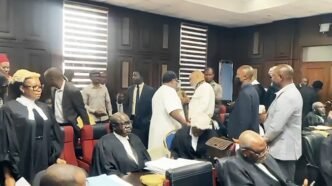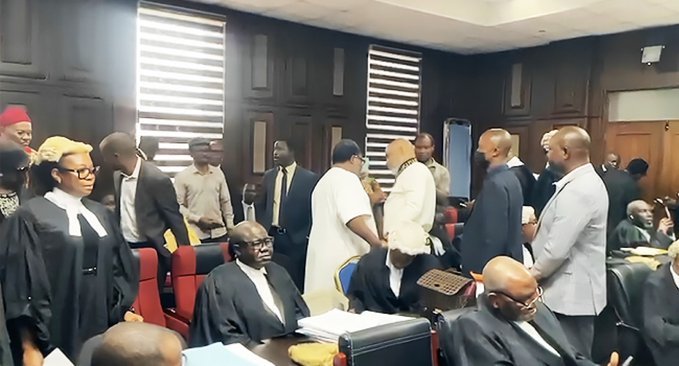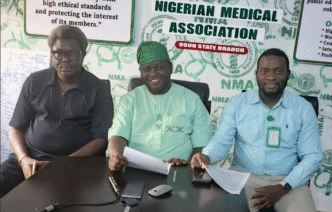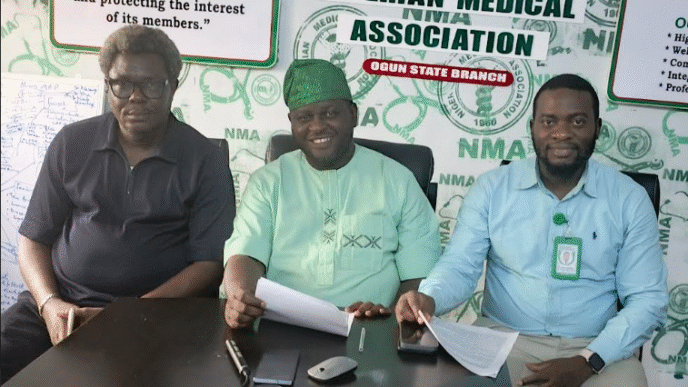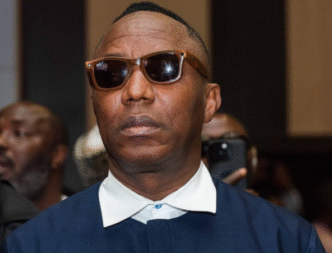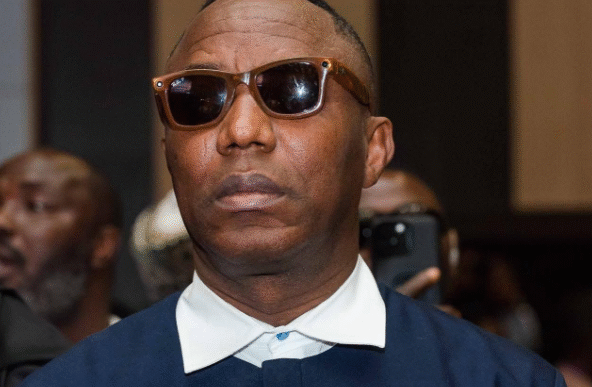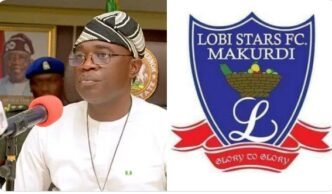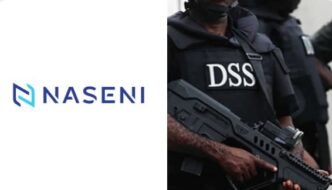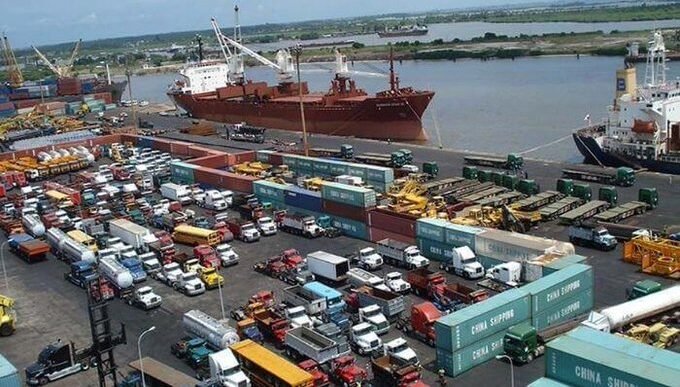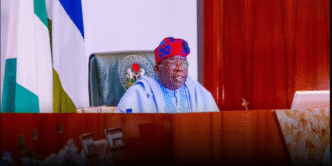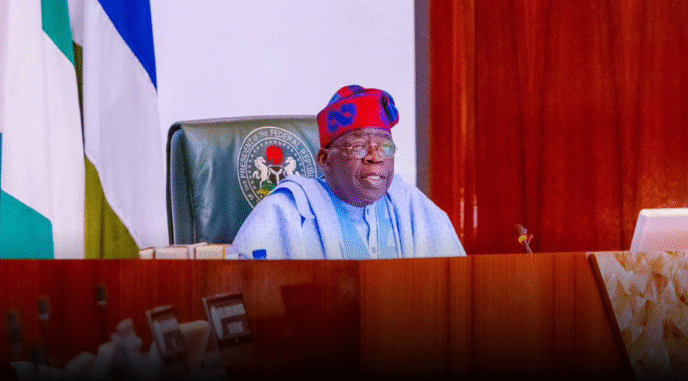Abuja, Nigeria | October 23, 2025
The ongoing treasonable felony trial of the leader of the Indigenous People of Biafra (IPOB), Nnamdi Kanu, took a dramatic turn on Thursday at the Federal High Court in Abuja when his legal team announced their withdrawal from the case, forcing Kanu to declare that he would personally conduct his own defence.
The courtroom was tense as the development unfolded before Justice Binta Nyako, who has presided over the case since Kanu’s re-arrest and extradition to Nigeria in 2021. The lead counsel to the defendant, Ifeanyi Ejiofor, alongside other members of the legal team, informed the court of their decision to discontinue representation, citing persistent interference and lack of adequate access to their client.
Defence Team Withdraws from Case
Ejiofor told the court that the defence team had faced mounting challenges in their efforts to properly represent Kanu. He alleged that their access to him at the Department of State Services (DSS) facility in Abuja had been repeatedly obstructed, making it impossible to prepare effectively for trial.
He stated, “We have made several attempts to gain unrestricted access to our client, as required under the law, but the current situation has made it extremely difficult to conduct a fair and professional defence. Under these circumstances, we have decided to withdraw from further participation in this case.”
The announcement was met with murmurs in the courtroom, as journalists, observers, and security personnel watched closely. Justice Nyako, maintaining her composure, acknowledged the withdrawal but reminded the defence that the court could not compel any lawyer to continue in a case once they had chosen to withdraw.
Kanu Insists on Self-Representation
Moments after his lawyers’ withdrawal, Nnamdi Kanu, dressed in his usual white outfit, stood up to address the court directly. Speaking firmly, he declared that he would take over his defence and conduct the case himself.
According to Kanu, “I have endured a lot in this courtroom. My lawyers have been intimidated and frustrated at every turn. I can no longer sit back and allow this charade to continue. I will defend myself to ensure that the truth is told.”
He added that his decision was not an act of defiance against the judiciary but a necessity born out of frustration and the need to present his own version of events without external interference.
Justice Nyako, while responding, reminded Kanu that under Nigerian law, a defendant has the right to self-representation. However, she advised him to consider engaging new legal counsel before the next adjourned date, to ensure that his rights are fully protected.
Prosecution Maintains Readiness
On the part of the Federal Government, the lead prosecuting counsel, M. B. Abubakar, expressed readiness to continue with the trial, stating that the withdrawal of the defence lawyers would not affect the progress of the case.
Abubakar said, “The defendant has the constitutional right to represent himself if he so wishes. The prosecution is fully prepared to proceed and will continue to present witnesses as scheduled.”
He added that the government remains committed to ensuring that justice is delivered in line with the rule of law and that due process is followed throughout the trial.
Case Background and Legal Context
Nnamdi Kanu is facing seven amended charges bordering on treasonable felony, terrorism, and incitement against the Nigerian state. The Federal Government alleges that Kanu used his position as leader of IPOB to promote activities aimed at destabilizing the country, including broadcasting inflammatory messages on social media and Radio Biafra.
Kanu was first arrested in 2015 and detained on charges of treasonable felony. He was granted bail in 2017 under strict conditions but later fled the country following a military operation at his residence in Afara-Ukwu, Umuahia, Abia State.
In June 2021, he was rearrested in Kenya and extradited to Nigeria in what his lawyers described as an extraordinary rendition — a claim the Nigerian Government has consistently denied. Since then, Kanu has remained in DSS custody in Abuja, with the court repeatedly denying his bail applications on national security grounds.
Rights Groups and International Attention
The case has attracted global attention, with local and international human rights organizations calling for a fair trial. Groups such as Amnesty International and Human Rights Watch have urged Nigerian authorities to ensure that Kanu’s legal and human rights are respected, including unrestricted access to his lawyers and medical care.
In recent months, tensions have risen among his supporters across southeastern Nigeria, where IPOB continues to maintain significant influence despite its proscription by the Federal Government in 2017.
Security Tightened Around Court Premises
Outside the Federal High Court in Abuja, heavy security presence was observed on Thursday morning as combined teams of the Nigeria Police Force, Department of State Services, and Nigeria Security and Civil Defence Corps (NSCDC) manned the premises to prevent any potential disturbance.
Supporters of the IPOB leader gathered at strategic points around the court, chanting solidarity songs and demanding his release. Some carried placards with inscriptions such as “Free Nnamdi Kanu Now” and “Justice for Biafra.”
Despite repeated warnings from security officials, the supporters remained peaceful but vocal throughout the proceedings.
Court Adjourns Till November
At the end of Thursday’s session, Justice Binta Nyako adjourned the matter till November 19, 2025, to allow Kanu time to either secure new legal representation or prepare his defence independently.
The judge also cautioned against further attempts by any party to disrupt the trial, emphasizing that the court would continue to dispense justice without bias.
Political and Legal Implications
Legal analysts say the latest development could significantly alter the trajectory of the case. Some observers believe Kanu’s decision to defend himself may expose perceived inconsistencies in the prosecution’s case, while others warn that it could further complicate proceedings and prolong the trial.
A senior constitutional lawyer, who spoke on condition of anonymity, said:
“While it is within his right to represent himself, self-representation in a complex treason trial is rare and risky. The legal implications are enormous, and it may affect the speed and direction of the case.”
The development also has potential political implications, particularly in Nigeria’s Southeast region, where Kanu’s supporters view him as a symbol of self-determination. Political leaders from the region have often called for a peaceful resolution to the case, urging the Federal Government to explore dialogue as a way forward.
What Next for Nnamdi Kanu?
With his lawyers out of the picture and a new phase of the trial looming, Nnamdi Kanu now faces the challenge of navigating a complex legal system largely on his own. His decision to defend himself is seen as both a bold and risky move that could redefine his legal strategy.
The Federal Government, on its part, appears determined to pursue the case to its conclusion, maintaining that IPOB’s activities have posed a threat to national unity and public safety.
As the November adjournment date approaches, all eyes will once again be on the Federal High Court in Abuja, where one of Nigeria’s most politically sensitive trials continues to unfold.

